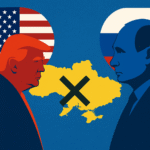Switzerland’s gold refining industry has come under intense scrutiny following the collapse of trade talks with the United States and the imposition of steep tariffs by President Donald Trump’s administration. The dispute has triggered a national debate over whether the sector should shoulder some of the economic fallout.
Earlier this month, Washington announced a 39% tariff on certain Swiss imports and an unprecedented levy on gold bars, moves aimed at reducing the US trade deficit. Gold was Switzerland’s single largest export in 2024 — worth $61.5 billion over 12 months and accounting for 27% of total exports, ahead of pharmaceuticals. The Swiss government failed to secure tariff relief during last-minute negotiations in Washington.
While Switzerland has no domestic gold mines, its refineries — the largest in the world — play a pivotal role in global trade, recasting large gold bars shipped between London and New York into different sizes. This activity significantly adds to Switzerland’s trade surplus with the US, which some politicians blame for the failed negotiations.
Calls for Accountability
Centrist and left-wing lawmakers have proposed measures to make the industry “pay for the damage,” including a sustainability tariff or special taxation. Hans-Peter Portmann, a Free Democratic Party lawmaker, suggested sending gold back to its origin countries, such as the UK or Brazil, for direct shipment to the US. Green Party leader Lisa Mazzone also called for increased taxation to offset the tariffs’ impact.
Critics argue the government underestimated the political sensitivity of gold in trade talks, while some economists believe temporary restrictions on gold exports could strengthen Switzerland’s negotiating position.
Industry Defends Role
Leaders in the sector reject claims of wrongdoing, noting Switzerland’s global reputation for precision and regulation in precious metals refining. “The precious metals industry, and gold in particular, is a very good flag bearer for Switzerland,” said James Emmett, CEO of refiner MKS Pamp. Others stressed that the industry simply responded to market demand and should not be singled out.
Trade flows have been volatile this year. Early in 2025, Swiss refineries were processing gold for US delivery, but the flow reversed in April, with gold returning from the US to London. In recent months, shipments to the US have nearly stopped due to tariff uncertainty.
The industry warns that the tariffs could have knock-on effects beyond bullion, potentially impacting Switzerland’s luxury watch exports to the US. Christoph Wild, president of the Swiss Association of Manufacturers and Traders of Precious Metals, urged unity, saying: “Bashing one industry is the wrong way to resolve this issue.”
Possible US Expansion
In an effort to ease tensions, some Swiss refiners have floated the idea of expanding operations in the United States. MKS Pamp, which already owns a minting facility in Oklahoma, has expressed interest in investing further in US refining capacity, noting that the US is a major gold producer but has limited domestic refining infrastructure.
The Swiss government has pledged to continue negotiations, but for now, the gold industry finds itself at the heart of a geopolitical and economic storm — one that could reshape both its business model and Switzerland’s trade relations with Washington.








